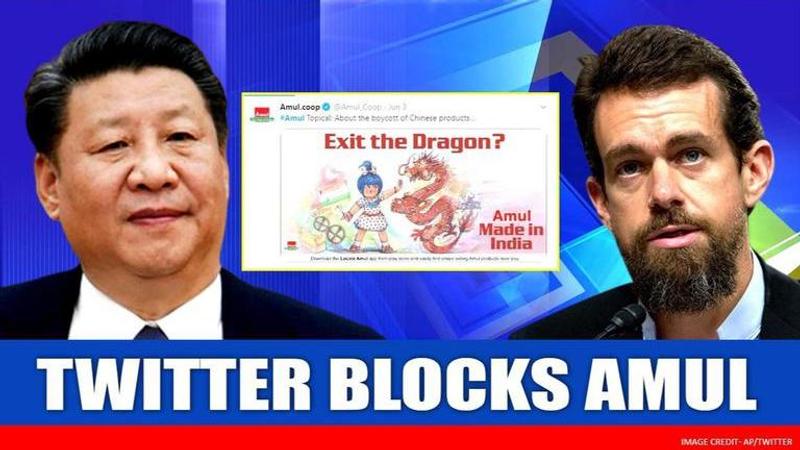Published 12:02 IST, June 6th 2020
Twitter blocks Amul after 'Exit The Dragon?' topical about China; restores later
Twitter blocked social media page of dairy giant Amul allegedly for a doodle against China amid border dispute with India. The page was restored later.

Even as India and China are holding Corps Commander-level talks on Saturday at Moldo, Twitter blocked the social media page of Dairy giant Amul for a limited period on Saturday morning. Although the page has been restored now, Twitter had blocked Amul allegedly for publishing a doodle against China. Amul in the creative had written 'Exit the dragon' in a reference to the Chinese military entering Indian territory and in an obvious pun on Bruce Lee starrer movie 'Enter the Dragon'. The Amul girl in the creative is seen pointing at the Made in India products with her one hand and with other she stops the Dragon, which is a symbol for China. Chinese company like TikTok is seen behind the Dragon. The doodle was captioned as 'About the boycott of Chinese products..." in reference to the rising trend in India to boycott foreign goods after PM Modi appealed for Aatmanirbhar Bharat. Amul is known for its creatives on global and local topics that made headlines.
Here is the Amul doodle on Indo-China border dispute:
Here is the screengrab at 6.43 when Twitter had blocked Amul
At the time of publishing the article, Corps-Commander level talks are going on to end the standoff along the LAC at Moldo. Sources said that Lieutenant General Harinder Singh, the Commander of 14 Corps is holding talks with Major General Liu Lin, who is the commander of South Xinjiang Military Region of China's People's Liberation Army. Ten other officers from both sides are also present.
As per sources, both nations have tabled specific proposals to end the standoff and a number of skirmishes that have taken place between the army of both the nations along the LAC in the past few days. This crucial meeting comes after a breakthrough has not been achieved despite nearly 10 rounds of talks between the two sides.
Sonam Wangchuk's appeal to boycott Chinese products
Engineer turned education reformer Sonam Wangchuk posted a message on Twitter that went viral on the platform — "Cheen ko Jawaab, Sena degi bullet se, Naagrik dengey wallet se (Answer to China will be given by soldiers with their bullets and citizens with their wallets)".
Speaking to Republic TV on Friday, Sonam Wangchuk said the Chinese actions on the border with India are a result of domestic dissatisfaction over the Chinese government's handling of the COVID-19 crisis. He encouraged people to drop the use of Chinese softwares "within a week". Wangchuk went on to suggest that Indians need not depend on cheap Chinese products and look for domestic alternatives.
"We should uninstall all their apps that make their (Chinese) companies rich. That money goes to make bombs and bullets to point at our borders. So first uninstall their apps. Then we should vote out hardware like electronics, clothes, and machines slowly over a year. This signal, first from India and then the rest of the world will hurt China which will affect their economy," Wangchuk said.
Remove China Apps and Mitro app removed from Google
Earlier, 'Remove China Apps' which gained massive popularity in India crossing over 5 million downloads since its release in May has been pulled down by the Google Play Store on account of violating the Google Play Store’s policies. 'Remove China Apps' developed by Jaipur based company-- OneTouchAppLabs detected apps made in China on the users' phones and provided a simple UI to remove them. In less than two weeks, the app had crossed one million downloads and was the top free app available on the Google PlayStore.
Moreover, Google also removed the Mitron app, a much-touted Indian alternative to TikTok, from its Play Store for reportedly violating its ‘spam and minimum functionality' policy. Mitron app emerged from nowhere and crossed 5 million downloads within a month of its launch on Play Store but, later, reports emerged that the app owner bought the source code from a Pakistani company Qboxus and rebranded it as Mitron.
Updated 15:35 IST, June 6th 2020





